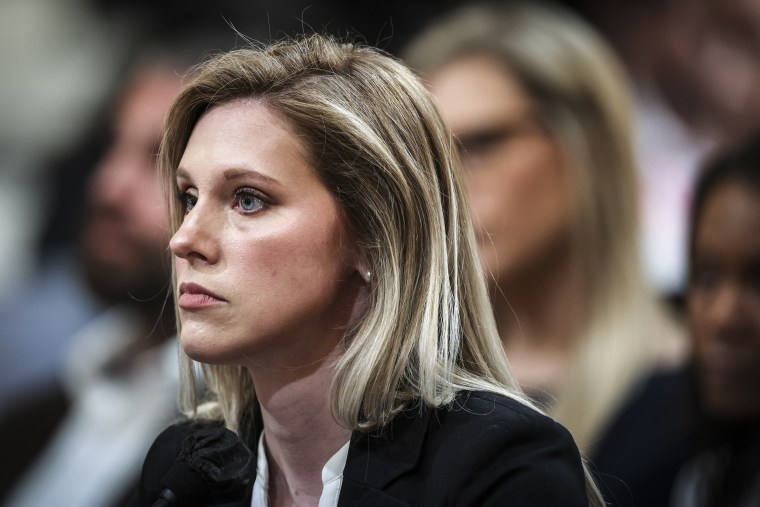WASHINGTON — As a Republican who played a key role in trying to overturn the 2020 election results for former President Donald Trump was elected House speaker on Wednesday, a U.S. Capitol Police officer testified in federal court about the lingering impact of the brutal Jan. 6 attack perpetrated by a mob that believed those election lies.
U.S. Capitol Police Officer Caroline Edwards, the first officer seriously injured on Jan. 6, 2021, testified Wednesday afternoon in the bench trial of Ryan Samsel and four other Trump supporters. Samsel, who was carrying an enormous flag that featured Trump depicted as Rambo from the Sylvester Stallone films, is accused of pushing a metal bike rack into officers, causing Edwards to stumble back and hit her head and briefly black out.
Samsel is on trial before U.S. District Judge Jia M. Cobb, alongside co-defendants James Tate Grant, Paul Russell Johnson, Stephen Chase Randolph and Jason Benjamin Blythe.
Edwards testified Wednesday that she and other officers "were the line of defense" on the west side of the Capitol. After the initial breach of the barricades near Peace Circle, rioters viciously assaulted law enforcement officers and overtook the platform that had been set up for President Joe Biden's inauguration.
As Samsel and other rioters broke the barricades on Jan. 6, Edwards testified, she lost her footing and hit her head on a metal handrail behind her. "I landed with my head on the stairs," she said. The last thing she remembered was the clank she heard when her jaw hit metal, she said.
Adrenaline took over, Edwards testified, saying that when another officer told her they had to move, she immediately focused in, despite feeling dazed and confused.
"The lights were on," Edwards said, describing her demeanor, "but no one was home."
At that point, Edwards said, she believed that rioters were trying to get to the inauguration platform to tear it down. Call after call flooded in over her radio, requests for assistance as the mob took over the Capitol. At one point, she said, Samsel approached her, giving her back the beanie that had fallen off her head during the initial breach. Samsel kept telling her that he was the one who helped pick her up off the ground after her fall. Edwards said that she placated him — yeah, OK, thanks — but that she felt he was trying to convince her of something. She was "uncomfortable," she said, when Samsel placed his hand on her.
There was so much to do as the chaos unfolded, she said, and Edwards stayed in the fight. "I knew that I was hurt, but it just wasn't a factor," Edwards said. Another call cracked over the radio: A rioter had breached an evacuation route, she said, and Edwards handcuffed the person and took him into prisoner processing at the headquarters building.
Edwards started feeling groggy and dizzy, she said, and she wasn't quite sure what was happening. She asked a colleague where the computers were, even though she had been to headquarters and used the computers before, she testified, adding that when she sat down in front of the monitor, "it was like there were two of them."
She remembers feeling exhausted, she said, and she blacked out again — she was not sure for how long, but she remembered waking up, slumped over in a chair in a cold sweat.
Another officer said her face looked "crooked" and asked her whether she'd been struck, she testified. They called an ambulance. She felt a dull pain along her jaw and head. Hospitals were full, so the ambulance took her to Silver Spring, Maryland, where hospital personnel put her in a neck collar and gave her a CT scan, she said.
"Absolutely excruciating," Edwards said, describing the pain she began feeling in her head. She felt like screaming, like throwing up, like crying, she told the court. It felt like someone had taken her head and tried to tear it apart, she said.
In the nearly three years since the attack, Edwards has tried "quite a few things" to treat the migraines she has had ever since her jaw hit metal. She testified that one of the treatments required her to inject her thigh every month.
"I have almost no sick leave left," Edwards said. "I've used all my leave dealing with my migraines."
Edwards was away from work for a few months after the Jan. 6 attack and then returned on light duty. That essentially meant sitting at a desk, answering phones. It was demoralizing, she said.
"My job is not to answer phones," Edwards said. "It's to be a police officer."
Edwards had another medical episode and was wheeled out on a gurney, and Capitol Police were hesitant to return her to full duty. Today, she said, she still uses blue-light-blocking glasses when she uses a computer.
Edwards is now a peer support counselor for officers, helping other officers who had emotional trauma after the attack. Several officers who served at the Capitol on Jan. 6 have died by suicide, including Jeffrey Smith, who was found to have died in the line of duty because his suicide was a direct result of the assaults he endured on Jan. 6.
Samsel is represented by Stanley Woodward, a Washington attorney who had represented several other Jan. 6 defendants, as well as Trump aides who have been caught up in the federal investigations being run by special counsel Jack Smith. One of the aides, Walt Nauta, was charged in the classified documents case in Florida and had pleaded not guilty.
During cross-examination, Woodward noted the "incredibly difficult" situation Edwards has gone through.
Woodward asked Edwards about the emotional strain she'd been through in the years since Jan. 6, and whether she'd agree that she'd lived with a lot of stress since the Capitol attack.
"I believe we all have," Edwards replied.

